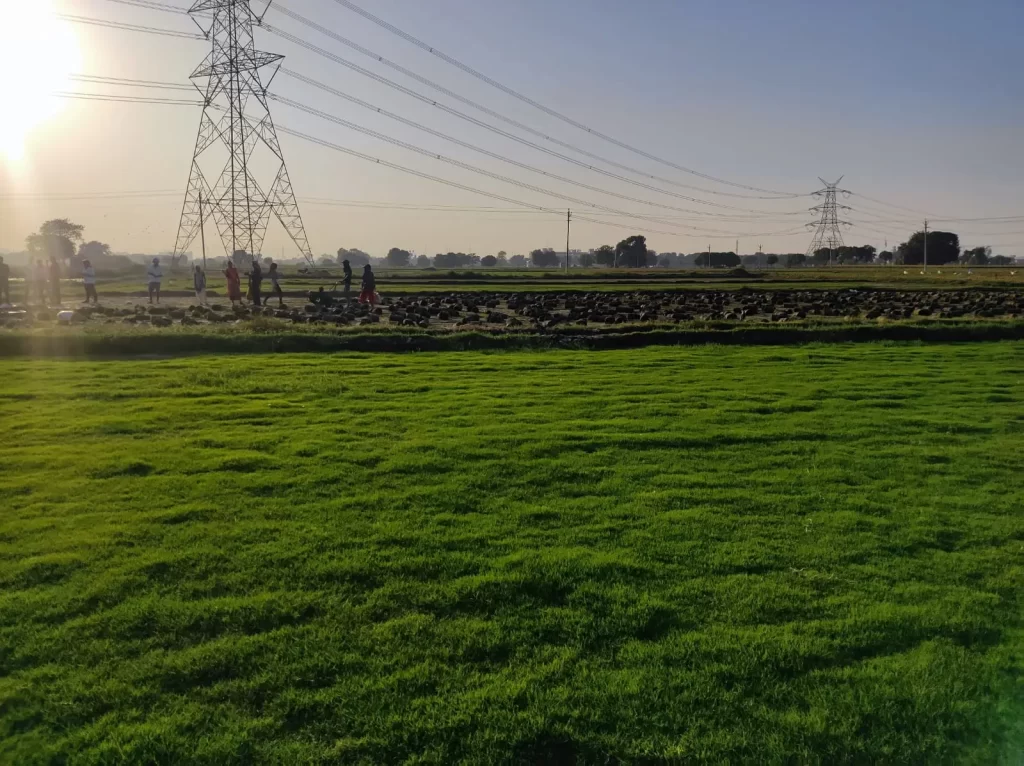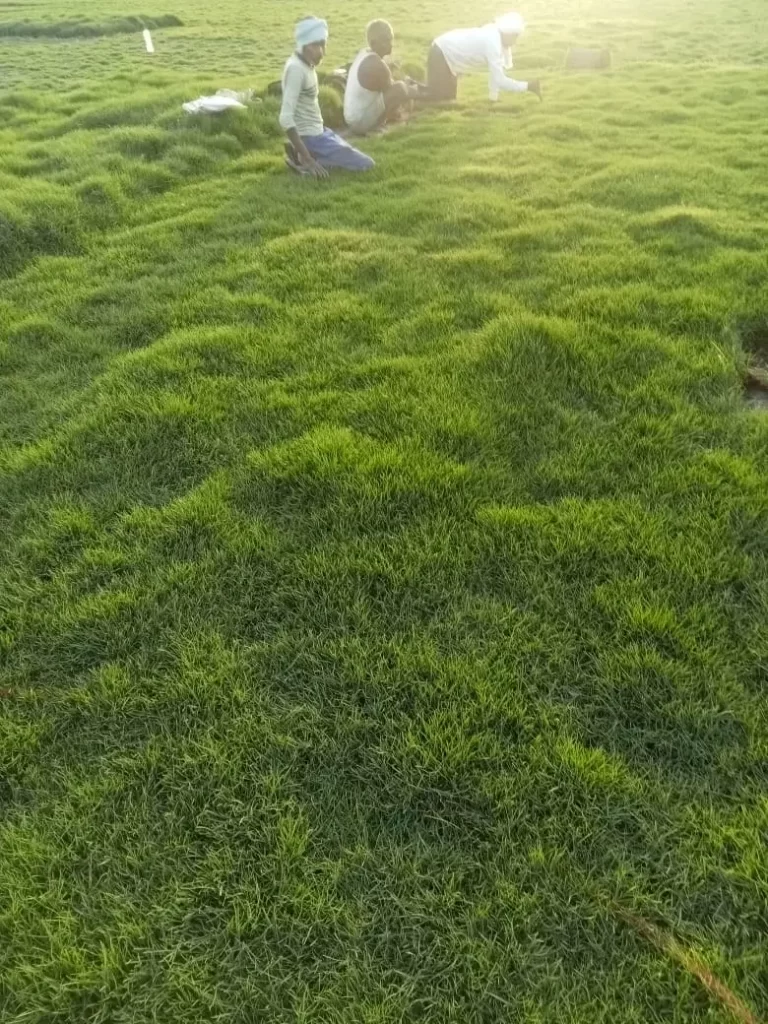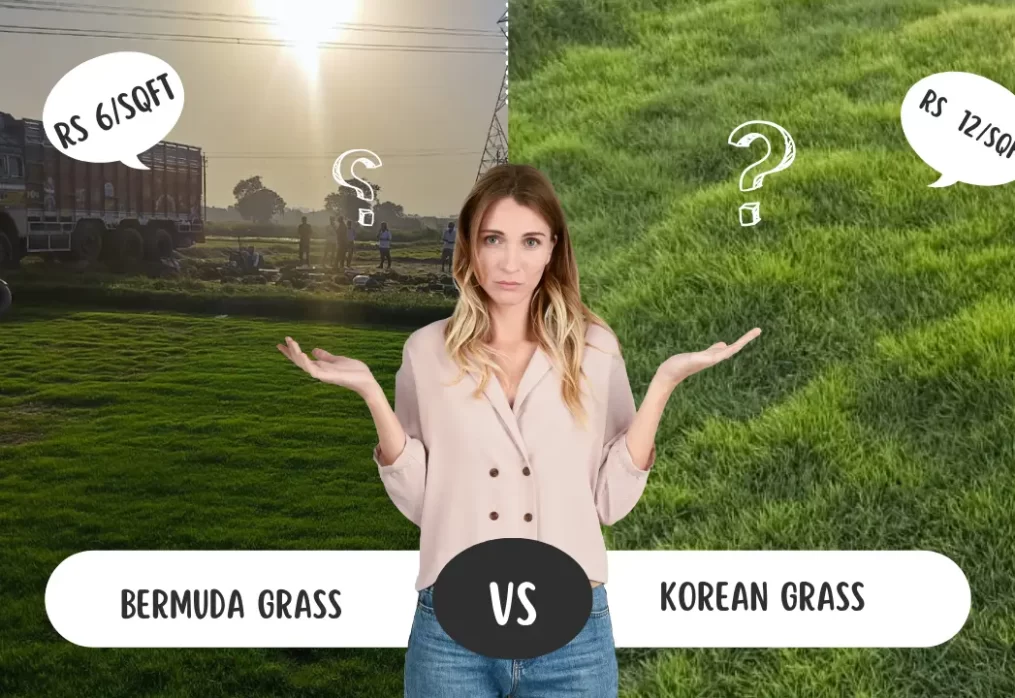Bermuda Grass vs Korean Grass – Which is Better for Lawns?
Introduction
When it comes to creating the perfect lawn, one of the biggest decisions you’ll face is choosing the right type of grass. Two popular options that often spark debate are Bermuda Grass and Korean Grass. Both bring their own strengths, but the best choice depends on your climate, maintenance preferences, and the overall look you want. Let’s break it down in detail to help you decide which is the better option for your lawn.
What is Bermuda Grass?
Bermuda Grass is a warm-season grass native to Africa but now widely grown in tropical and subtropical regions across the world. Known for its fine texture, deep green color, and aggressive growth habit, it thrives in hot, sunny areas and spreads quickly through both stolons and rhizomes.
- Best climate: Hot and sunny regions
- Key traits: Fast-growing, hardy, excellent recovery from damage

What is Korean Grass?
Korean Grass, also called Zoysia Tenuifolia, is a slow-growing, fine-textured grass with a beautiful velvety appearance. Unlike Bermuda, Korean Grass prefers cooler, shaded environments and doesn’t spread aggressively. It’s often chosen for its ornamental appeal and low-maintenance needs.
- Best climate: Temperate and slightly shaded areas
- Key traits: Thick carpet-like growth, minimal mowing, aesthetic appeal

Visual Differences Between Bermuda and Korean Grass
- Texture: Bermuda is fine and soft; Korean Grass is even finer, with a dense, velvety texture.
- Color: Bermuda is medium to dark green, while Korean Grass is typically a bright, lush green.
- Overall look: Bermuda looks sporty and uniform, while Korean Grass looks luxurious and ornamental.
Climate Suitability
- Bermuda Grass: Thrives in hot climates, tolerates drought, and loves direct sunlight.
- Korean Grass: Performs best in cooler climates, tolerates partial shade but struggles under extreme heat.
👉 If you live in a hot city like Delhi, Chandigarh, or Hyderabad, Bermuda is the stronger choice. For cooler or shaded lawns, Korean Grass works beautifully.
Growth and Maintenance Needs
- Mowing: Bermuda grows aggressively and needs frequent mowing (every 5–7 days). Korean Grass grows slowly, so mowing is needed only once every few weeks.
- Fertilization: Bermuda requires regular fertilization, while Korean Grass needs less.
- Watering: Bermuda handles drought better, whereas Korean Grass prefers consistent moisture.
Check out our Gardener Services to help keep your plants healthy and beautiful.
Soil Requirements
- Bermuda Grass: Prefers sandy or well-draining soils.
- Korean Grass: Adapts well to loamy soils and shaded garden beds.
Durability and Traffic Tolerance
- Bermuda Grass: Highly durable, ideal for sports fields and children’s play areas.
- Korean Grass: Not suitable for heavy foot traffic; best for decorative purposes.
Pest and Disease Resistance
- Bermuda Grass: Prone to armyworms, mites, and fungal issues if not maintained.
- Korean Grass: Generally resistant but may face root rot in overwatered conditions.
Cost Comparison
- Bermuda Grass: Lower initial cost, but higher ongoing maintenance due to frequent mowing and fertilization.
- Korean Grass: Higher upfront cost (especially for sod rolls), but lower maintenance in the long run.
Eco-Friendliness and Water Usage
- Bermuda is drought-tolerant, making it eco-friendly in water-scarce areas.
- Korean Grass requires more consistent watering but saves on mowing emissions.
Best Uses for Bermuda Grass
- Sports fields
- Golf courses
- Sunny, high-traffic lawns
Best Uses for Korean Grass
- Shady garden areas
- Ornamental landscapes
- Low-maintenance decorative lawns
Pros and Cons of Bermuda Grass
Pros:
- Fast recovery from damage
- High durability
- Thrives in heat
Cons:
- Needs frequent mowing
- Struggles in shade
Pros and Cons of Korean Grass
Pros:
- Luxurious, soft look
- Minimal mowing
- Works in shaded areas
Cons:
- Slow growth
- Poor traffic tolerance
Which Grass is Better for Indian Lawns?
In hot Indian cities, Bermuda Grass is often the better choice because it thrives under the sun and survives heavy use. However, if your lawn is small, shaded, and more decorative, Korean Grass might be the winner.
Tips for Lawn Owners Choosing Between the Two
- Consider sunlight: Lots of sun? Go with Bermuda. Shaded areas? Korean Grass.
- Think about maintenance: If you enjoy frequent lawn care, Bermuda is fine. Prefer low-maintenance? Korean Grass is easier.
- Traffic: For kids and pets, Bermuda wins. For peaceful garden beauty, Korean Grass is ideal.
Conclusion
Both Bermuda Grass and Korean Grass have their place in lawn care. The “better” choice depends on your climate, how much time you want to spend maintaining your lawn, and whether you want durability or beauty. Bermuda shines in hot, sunny lawns with heavy use, while Korean Grass is perfect for shaded, decorative spaces.
FAQs
1. Which grass is easier to maintain?
Korean Grass, since it grows slowly and requires less mowing.
2. Can Bermuda Grass and Korean Grass grow together?
Not recommended—Bermuda’s aggressive growth can overtake Korean Grass.
3. Which grass is better for shady areas?
Korean Grass is more shade-tolerant than Bermuda.
4. Which grows faster – Bermuda or Korean?
Bermuda grows much faster and spreads aggressively.
5. Which is more cost-effective in the long run?
Korean Grass, since it needs less mowing and fertilization, though the initial cost is higher
Last Updated on 1 week ago by Anjali Mehra Ph.D. in Horticulture (Punjab Agricultural University)
- How Long Does Lawn Grass Last After Installation? (2026 Expert Guide) - February 6, 2026
- White Ants in Lawn Grass: Causes & Permanent Solution - February 1, 2026
- Best Grass for Farmhouses in India (Low Maintenance Options) - January 20, 2026
